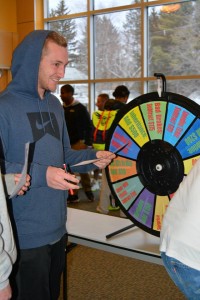 You’ve earned good grades in your classes. You’ve taken all the required standardized tests. You know you want to go to graduate school and where you want to study. Yes, you’ve got to write a personal statement, but that shouldn’t be a problem. After all, you’ve spent the last four years writing papers, including some in-depth research projects. How hard could one two-page essay be?
You’ve earned good grades in your classes. You’ve taken all the required standardized tests. You know you want to go to graduate school and where you want to study. Yes, you’ve got to write a personal statement, but that shouldn’t be a problem. After all, you’ve spent the last four years writing papers, including some in-depth research projects. How hard could one two-page essay be?
Very. The personal statement, or statement of purpose, is one of the most challenging documents you will ever compose. After all, you have to explore your intellectual or professional interests, describe your qualifications, and explain your interest in a particular program. That’s a lot to convey in 600-800 words! In addition, the essay should showcase your best writing: succinct, clear prose with no grammatical, spelling, or punctuation errors. Finally, you will have to adapt your statement to particular schools and programs; in some cases, you may have to revise it completely.
This may sound daunting, but don’t be discouraged – even if writing is not your forte. If you’re a good student with a strong interest in your field, you have a compelling story to tell. Follow this plan to construct an effective personal statement.
1.) Start Early. By early, I mean months before your application materials are due. This will give you ample opportunity to revise your essay and proofread it multiple times before the deadline. (Bear in mind that the due date is the last possible moment you can submit your application. By procrastinating, you leave yourself open to all sorts of last-minute emergencies, including illness, computer glitches, and busy recommenders. Be smart and make sure all components of your application – recommendations, test scores, personal statement, writing samples – are in at least a couple weeks ahead of the deadline.)
2.) Address the Entire Prompt. Most graduate programs ask applicants to discuss their scholarly interests, their relevant academic, personal, and professional experience, and their reasons for choosing that particular department. Read the entire prompt carefully and respond to every part of it. Some departments may not specify what they want you to explore; they may merely require a biographical sketch or statement of purpose. In that instance, compose an essay that describes all of the above.
3.) Be Specific. People who study literature love to read. Biology majors like science. Aspiring social workers want to help others. None of this is surprising – and that’s why you shouldn’t include it in a personal statement. The admissions committee already assumes you have a general interest in the field. Your job, as an applicant, is to persuade them of the depth of your commitment. Discuss the scholarly research you want to pursue in graduate school or the contributions you hope to make in your career. For example, an MA candidate in history might explore the effect of the Civil War on the New England fishing industry while a graduate student in physical therapy might have a particular interest in working with stroke patients.
Once you’ve described your academic and professional goals, connect them to the program in question. Discuss how its faculty, courses, and research opportunities relate to your interests. By addressing how your interests align with the department’s strengths, you establish yourself as a serious candidate who has carefully researched the program.
What you don’t want to do is bring up personal reasons for selecting that institution. For example, you should not say, “I am interested in the Master’s program in Geology at the University of Wyoming because my boyfriend goes there” or “I am applying to the University of California at Santa-Barbara because I have always wanted to live in California.” This may be true, but strive to find other factors – specific faculty, courses, or research institutes – that attract you to that program. Only mention personal motives if they are relevant to your goals. For example, you might write that you are applying to the University of Vermont Medical School because you have a strong interest in providing primary care to Vermont communities.
4.) Be Professional. Think of a personal statement as an interview on paper. (Some programs also require in-person or phone interviews.) You want to present yourself as a serious student who can work with others, assumes responsibility, and generally acts like an adult. Thus, your essay should discuss relevant experiences – research projects, jobs, internships, and volunteer work – that demonstrates these qualities and the depth of your interest in the field.
In some cases, your essay may have to address a weakness – either because the prompt requires it or because your transcript contains some poor grades. This can be tricky: you don’t want to put yourself down, but neither do you want to appear whiny or childish. (“Yes, I earned a C- in Organic Chemistry, but that’s because science is hard for me/I do not like science/ my teacher was disorganized/ I had a lot going on that semester.”) Here’s what to do: admit a weakness (“I struggled with writing or math/I had a bad semester.”). Then briefly describe the steps you took to rectify that problem. (“I sought tutoring/I became a more focused student/ I learned how to manage time.”) Your goal is to acknowledge the problem, show how you resolved it, and then move on. This allows you to present your weakness as a strength, an example of your resilience and determination.
5.) Get Help. You’re not in this alone. Castleton boasts many resources to help you prepare for graduate school. Make appointments to have faculty members review your essay; you should also meet with Career Services Director Renée Beaupre-White, Writing Specialist Bill Wiles, and/or a Writing Clinic tutor. Meet with them well in advance of your deadline to allow yourself time to revise your essay. Also, bear in mind that staff and faculty have busy schedules; you may have to wait a week or two for a meeting.
6.) Proofread. And proofread. And proofread. Read your essay forward and backward. Walk away from it for a couple days and then look at it again. Finally, have at least two other people – preferably faculty or staff – review it for you. Many graduate programs are highly selective, and you don’t want a careless error to stand between you and admission.
The personal statement is your chance to distinguish yourself from other applicants. That’s why it’s essential you take it seriously. Give yourself the time you need and the essay the attention it deserves, and you will be on your way to crafting a compelling and impressive piece of writing.
-Dorothy A. Dahm


